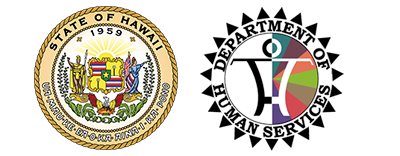DHS AND DOH PARTNER TO REDUCE CHILDHOOD HUNGER THROUGH JOINT PROJECT
Posted on Aug 3, 2023 in Featured, Main, NEWSFor Immediate Release: August 3, 2023
DHS AND DOH PARTNER TO REDUCE CHILDHOOD HUNGER THROUGH JOINT PROJECT
HONOLULU – Hawaiʻi was one of six states awarded a competitive grant from the nonprofit organization Share Our Strength through its No Kid Hungry campaign in April, 2021. As the grantee, the Department of Human Services (DHS) proposed an 18-month project to lay the foundation for interagency data-sharing and build capacity to analyze administrative data across nutrition programs—specifically the Supplemental Nutrition Assistance Progam (SNAP) and the Special Supplemental Nutrition Program for Women, Infants, and Children (WIC).This collaboration announcement marks the beginning of a multilayered project that will ultimately impact families for generations to come.
The goal of the Coordinating SNAP and Nutrition Supports to Reduce Childhood Hunger Demonstration Project is to invest in state infrastructures that leverage DHS’s SNAP and WIC, a related program under the Department of Health (DOH), to increase access to nutrition services for sustained impact.
“This initiative will enable both nutrition programs from DHS and DOH to understand trends in cross-enrollment, identify characteristics of vulnerable individuals and communities with low enrollment rates in eligible programs, and guide program and policy planning,” said Scott Morishige, Benefit, Employment and Support Services Administrator under DHS. “Advanced technology is moving us forward more quickly and accurately than the previous cumbersome and voluminous manual process.”
“This partnership between DHS and DOH creates a unique opportunity to share information so that we can better address food insecurity throughout the state,” said Melanie Murakami, WIC Services Branch Chief. “Households participating in an assistance program such as SNAP and Medicaid may be automatically income-eligible for WIC, increasing crucial food and nutritional support benefits.”
With SNAP and WIC working in tandem, this project aligns with DHS’s ʻOhana Nui framework, a multigenerational approach to service delivery that has proven to be more effective than one that separately addresses individual needs. Better outcomes for Hawaiʻi families result from concurrently addressing the needs of children, parents, and grandparents, meeting the state’s desire to coordinate and streamline the referral process to create lasting change.
As part of the project, Share Our Strength and its contracted grant administrator, the American Public Human Services Association, provided grantees with technical assistance. Grantees participated in cohort learning to share promising practices and opportunities to effect policy changes at the federal and state level to reduce childhood hunger through increased coordination between and across SNAP and child nutrition programs.
Grantees received funds to hire staff or contract services to lead project implementation in conjunction with flexible operating funds that may be used to invest in technology, materials, services, and other costs associated with the proposed project. SNAP contracted the Children’s Healthy Living Center of Excellence at the University of Hawaiʻi at Mānoa for technical assistance and data support.
What is SNAP?
SNAP provides nutrition benefits to supplement the food budget of needy families so they can purchase healthy food and move towards self-sufficiency. The Supplemental Nutrition Assistance Program (SNAP) is a federal program that provides nutrition benefits to low-income individuals and families that are used at stores to purchase food. The USDA Food and Nutrition Service (FNS) administers the program through its nationwide network of FNS field offices. Local FNS field offices are responsible for licensing and monitoring retail food stores participating in SNAP.
What is WIC?
The Special Supplemental Nutrition Program for Women, Infants, and Children (WIC) was established as a permanent, federally funded program in 1974 to safeguard the health of low-income women, infants, and children. WIC provides Hawaiʻi residents with nourishing supplemental foods, nutrition education, breastfeeding promotion, and health and social service referrals. The participants of WIC are either pregnant, breastfeeding, or postpartum women and children under age 5 who meet income guidelines and have a medical or nutritional risk. Non-U.S. citizens may qualify for WIC with proof of Hawaiʻi residency.
For more information, visit humanservices.hawaii.gov/bessd/snap/ and health.hawaii.gov/wic.
###
Media Contacts:
Amanda Stevens
Public Information Officer
Department of Human Services
[email protected]
(808) 586-4892
Melanie Murakami
Branch Chief, WIC Services
Hawaiʻi State Department of Health
[email protected]
(808) 586-8175
